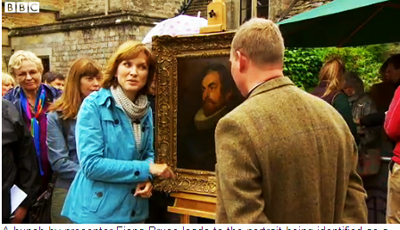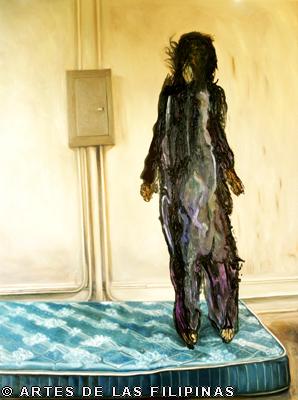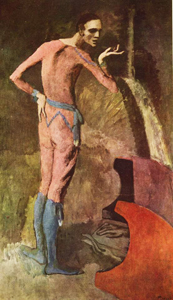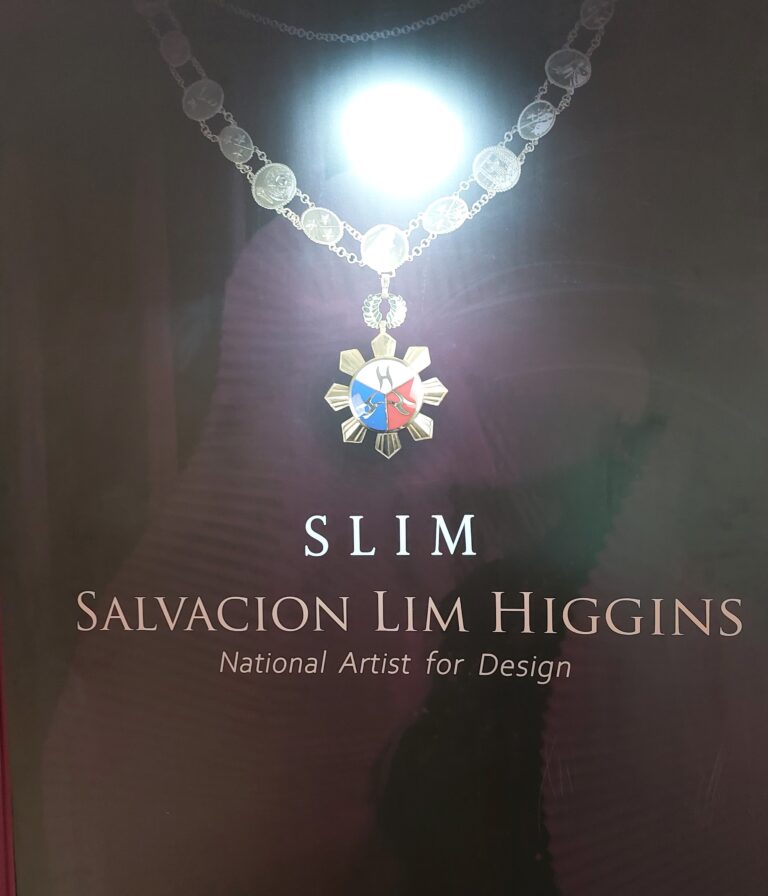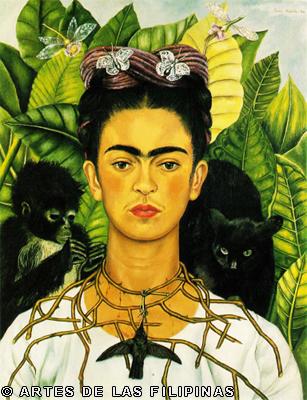
MARCEL BELLEZA ANTONIO:
THE SON, THE MAN, THE PAINTER
(Second of Two Parts)
By: Christiane L. de la Paz
Do you ever include your personal experiences in your works?
I do sometimes. I can’t recall which ones but I know I’ve done a series of works that are biographical in nature.
Do you ever repeat your subject?
Definitely. Not the same compositions but same subjects.
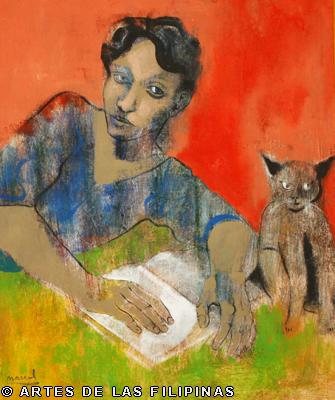
How do you do that?
Definitely in the way of composition but the idea is there. Like I got tired of doing harlequins, when I started doing that I thought it was always just paying homage to Picasso.
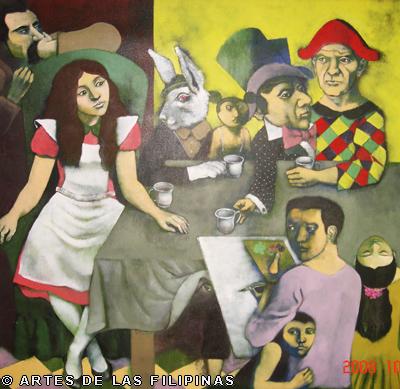
What about harlequins, what was it about them that fascinate you as a painter?
When I started painting them, I had no idea what comedia dell’arte was so I have no appreciation for that art. It was only when people started asking me about it that I found out more about my subject. But harlequins because I like its form. When I go through a phase and just play with paint, it’s not what you want to paint but what the paint reveals to you. It’s more about making marks on the canvas and trying to make sense out of it.

Would you know the difference between a harlequin and a clown?
I think clown is the general term. What I’m talking about are the traditional fool with a cap and belt. The harlequin is a character off the theater and they’re different in sensibilities. What I paint is the archetype of fools, in that sense. To be able to signify a fool you have to make him wear a symbolic cap.
How come your harlequins are all two-tone? You never want them colorful?
That’s not true. I use other colors for harlequins.
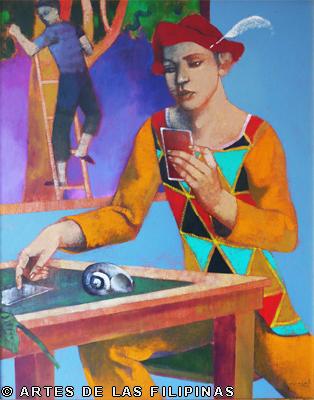
Why do your harlequins play cards?
Ahhh… well, the card game, it interests me because it caught the idea of play. A lot of my work has something to do with play. It has something that everyone can equate with and it’ll probably look different if my harlequin would be playing with a playstation (laughs loud). It’ll be less poetic.
But in the choice of painting, what type of cards do you put in your painting?
The figures in the paintings are not playing any type of card game at all, that’s the truth. They are simply designs.
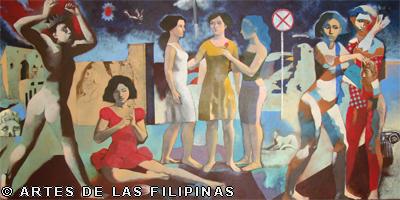
When you talk to collectors, it tends to get a little crazy…
That’s true because they over-analyze my works. I think the cards are just there to signify they’re playing cards, but no particular game and no particular meaning.

What about your figures? Your woman is seeing another man. Your man is writing a letter to a girl.
It’s an example of work that’s biographical in nature. I don’t want to go into that. I just want it open for interpretation. But some of my works are biographical in nature.
But Marcel your figures engage in adulterous acts…
(laughs) I have no further comment. (laughs loud)
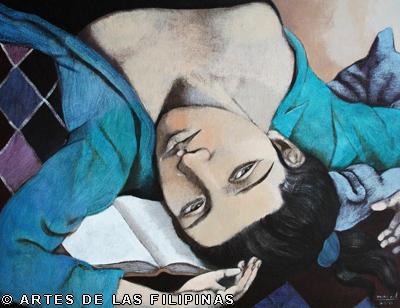
No, that’s not true. In hindsight, yes maybe. Nowadays I put them straight to the canvas. When I draw, I draw them on paper. Although there is merit in doing studies, it’s more of having a sense of understanding with regards to the medium. If you’re comfortable with the medium then you can do anything.
How do you motivate yourself to work when you don’t feel like painting?
Actually, that’s a simple question to answer. I always tell myself “Time to play, Time to play.” I don’t see it as work. It’s all about play. If I lose that element, it becomes a 9-5 job for me. I may need to buy a bundy clock when that happens. As long as I try to make something out of it that’s enjoyable.

So everyday, you feel like playing?
Yes, I have to. I’ll be doing this for the rest of my life. Painting is in my blood. Sometimes it gets tedious, boring even, but in general, I love what I do.
What do you do when you find it boring?
I just break out of the mold! Do something else.
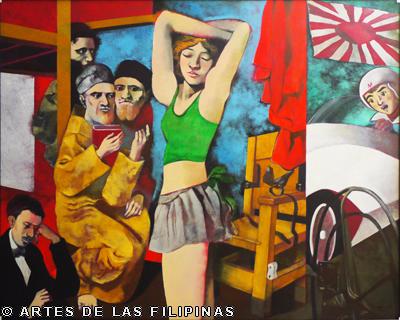
Like what?
Get to play real games! I never play in arcades. I just play at home with my kids.
Do commissioned paintings make up the bulk of your work?
Right now, yes. I am looking forward to finding my own time to explore new things.
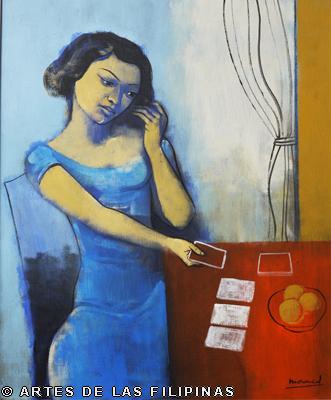
How long does it take you to finish a commissioned work?
Typically, four weeks more or less.
What is it about commissioned work that you don’t like?
Seriously, there are clients from hell, Christiane. Some would write exactly what they expect from the work. Gestures, the colors, how many persons.

How do you deal with that?
I just do it, that’s it.
So you try to please your clients?
I try to make it a painting first before anything else. I still try to make up for the lack of control with a sense of play. I still consider it play. If there is no control with the subject matter and the details, then that becomes a different matter.
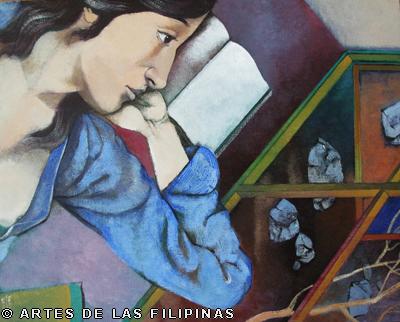
So what is it about commissioned work that you like?
Well, it’s a steady income, that’s one.
Who is the viewer on your mind when you paint?
I guess someone sophisticated enough to understand a painting in itself without having the artist to explain what it’s about. Someone who can appreciate a work of art. I’m not saying Christiane that all my outputs are art but they have to understand that something like that, a painting, needs to grow with you. You just don’t buy something, hang it on a wall because it matches the color of your sofa. God, I hope not.
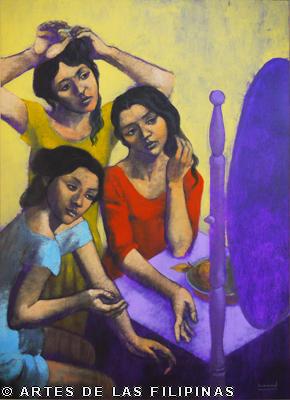
How do you feel when they tell you that? It has to match something in their house?
(Smiles) I don’t listen to them. I just ignore them. Like a certain collector, his head hurts trying to read my work. He was incessant in trying to ask me, “What is this in the painting?” To make him stop, I made a joke out of it that there was something about the work that he has to find out but there isn’t anything at all to begin with. I just want him to get into the groove of looking at a work, you know, to just appreciate it. I don’t want his mind to bleed.
Do you still go out of your way to discover new ways of doing things?
Oh definitely! When I get into my knowledge phase, there is a need for me to learn something about colors again. I need to refine my figures. That’s when my painting gets somewhat uptight.
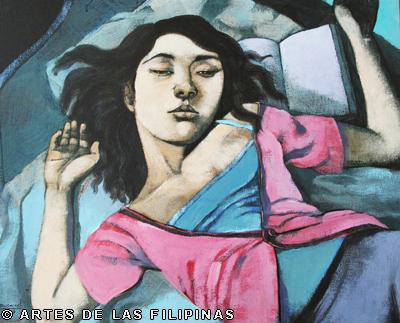
But in terms of going out, seeing new surroundings, do you do that?
I always believe that travel shakes you up. But I don’t find time to do that.
How do you handle the business side of being an artist?
My wife does that. Like my Mom, she handles the financial affairs. I guess women are good in handling money. My Mom is Ilocano kasi eh.

Considering your good sales, what aspect of your life has changed?
Well, what you see is what you get. As an artist, as a painter, I appreciate Spartan-like surrounding more than where I am now. I try not to spoil myself too much with regards to the environment. I kinda miss the old environment during my youth. We used to live in this old house which was stinky and I imagined myself to be like the painters in

Do you miss your early years?
Yeah, I kinda miss it, that’s true. Well, you see now my life is so ordered. Studio, a park. I miss the sense of chaos but a sense of orderly chaos. It excites me to be in that old surroundings.
What’s the best thing that has been written or said about your work?
I can’t recall. But Eric Torres has written quite a few good words about me.
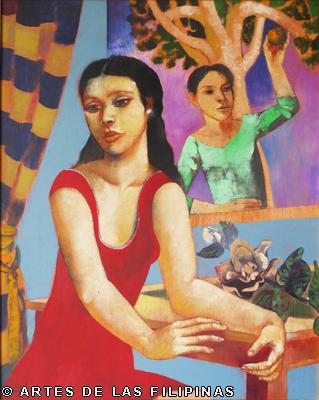
You don’t seem to have many exhibitions.
Yes, that’s true. But this year I have a series of shows planned.
Are you exclusive to any gallery?
Jonathan Sy gets from me regularly. He was the first one who invested heavily on me when I was starting out. I am thankful for his early support and it is something I will never forget.
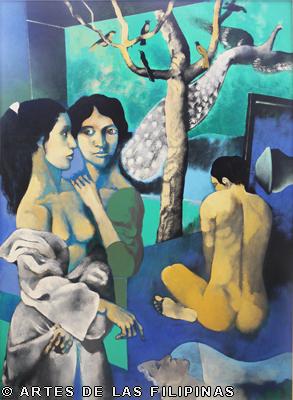
What is you favorite medium?
Of course, oil is my favorite medium of all! But like you, you’re very comfortable with writing, but think about the person who has this grand idea in mind but has no way of translating it into any other medium. I had this friend, he has grand ideas but he couldn’t find any other medium to express his ideas. Like for example, his social works, with that kind of theme, I suspect it will be more effective as a film medium rather than a painting. It’s funny, you know, you have this sense of responsibility to society, you have something to say about society, and you’re using the medium that is exclusive to galleries and only a very people can see that, only the upper economy can afford to buy that, then you’re not really talking the language of the masses if you’re using painting as a medium. But if you translate it to another medium like film you can show it for free, and you can get your message across.
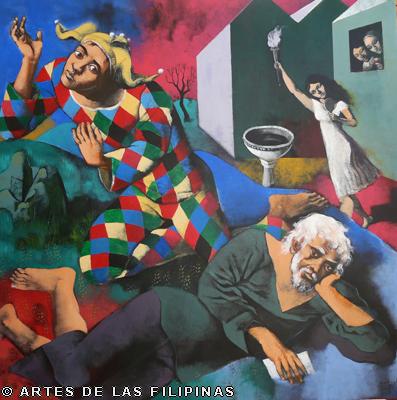
What do you believe as an artist?
(Short pause). I’m never comfortable in describing myself as an artist but more as a painter. I don’t have that kind of sense of being an artist, it uses responsibility. If I merely express myself as a painter, in really understanding myself and my world through painting, and that purpose alone, I believe in that. I don’t have a huge sense of responsibility. I just don’t have that emotional baggage or persuasion towards art. I cannot force myself to think in that mode. For as long as I understand the medium and I get to express myself, then I’m fine with that.
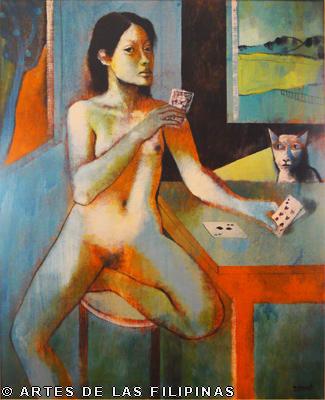
What do you think are the skills needed to be a painter?
As my Dad would always say, one should always have a good command of drawing, an exceptional command of drawing. Because painting to me is practically drawing with paint. It’s an application of pigments in canvas and of course, it got its complexities, too. But if you have a good command of drawing, you can translate it into paint.
What can you say is your clear talent in painting?
My clear talent… well, the medium of paint in itself and the way I rely on the figure as a vehicle for emotions.
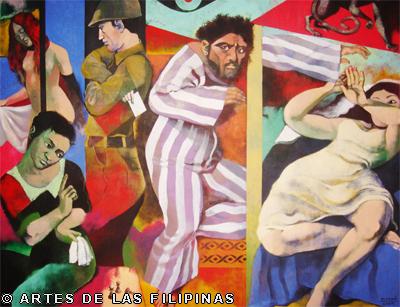
Who among the artists whose works you admire?
Jason Moss. I like his work a lot.
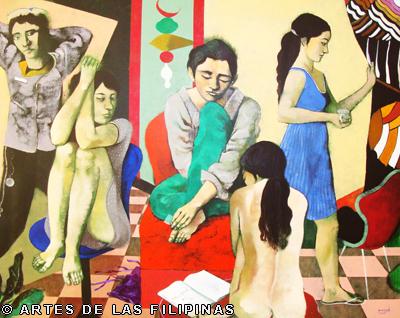
Who among the artists are your friends?
Most of them are my friends. I hardly go out of my way to see them, for the most part. More like I have no time for I am always painting. But I enjoy talking to my friend, Jojo de Veyra. He also paints, he dabbles in poetry. I have a collection of his works. At one time, I approached the idea that I wanted to make paintings based on his works. I haven’t gotten around to doing it yet, one of these days. I hope I find the time.
If you’re not a painter, who’s paintings can we find on your walls?
Probably works of Jason Moss. Borlongan, too. I kinda miss my classmates like Jonathan Olazo. He was my constant companion in college. He has so many things going on for him. I’ve been seeing less and less of his works but he is very talented.
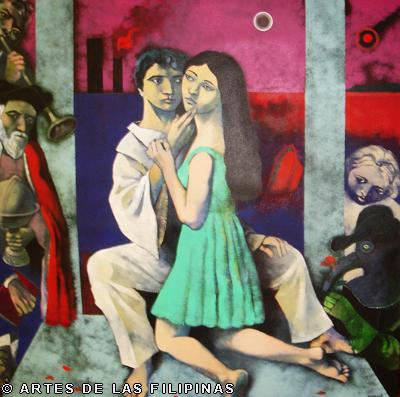
What is it about being a painter that you love?
Christiane, there is no bundy clock in what I do. You’re answerable to no one but yourself. And there’s no talking about retirement. Picasso was still working during his later days.
What can we expect from you in the coming years?
Well, a more loose style probably. A relaxed manner of working. I want to go back to my knowledge phase. My compositions have become tight.
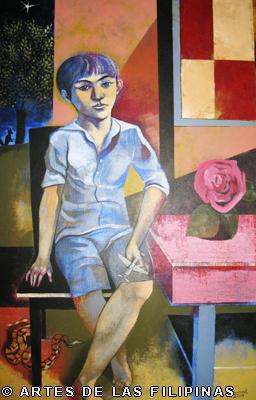
Do your children love your paintings?
They don’t comment much about the things that I do. Sometimes, my daughter says, “I like it Dad, it’s mysterious.” She’s in Grade Five now. And sometimes my son, Piolo, will come to me and show me a work of his own. Most of the time, it’s about what kids like. Right now, Piolo like war scenes. My youngest son, Enzo, is still clueless about the whole thing.
I heard you’re a voracious reader! What have you been reading before?
Well… I’ve been reading works of Umberto Eco.
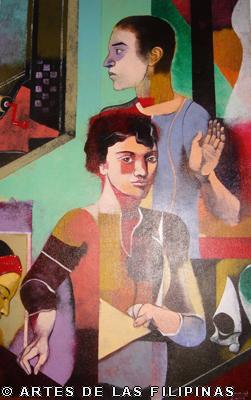
Have you ever heard comments that some people don’t like your work?
Oh yeah, of course! But it’s never my intention to please the audience first. It’s about me pleasing myself. I’m just glad I can do something I like and get people to like it like I do.
How do you want to be remembered as a painter?
Let history be the judge of that and my close friends. It’s not really that important. I’m just glad I’m able to do this thing.



